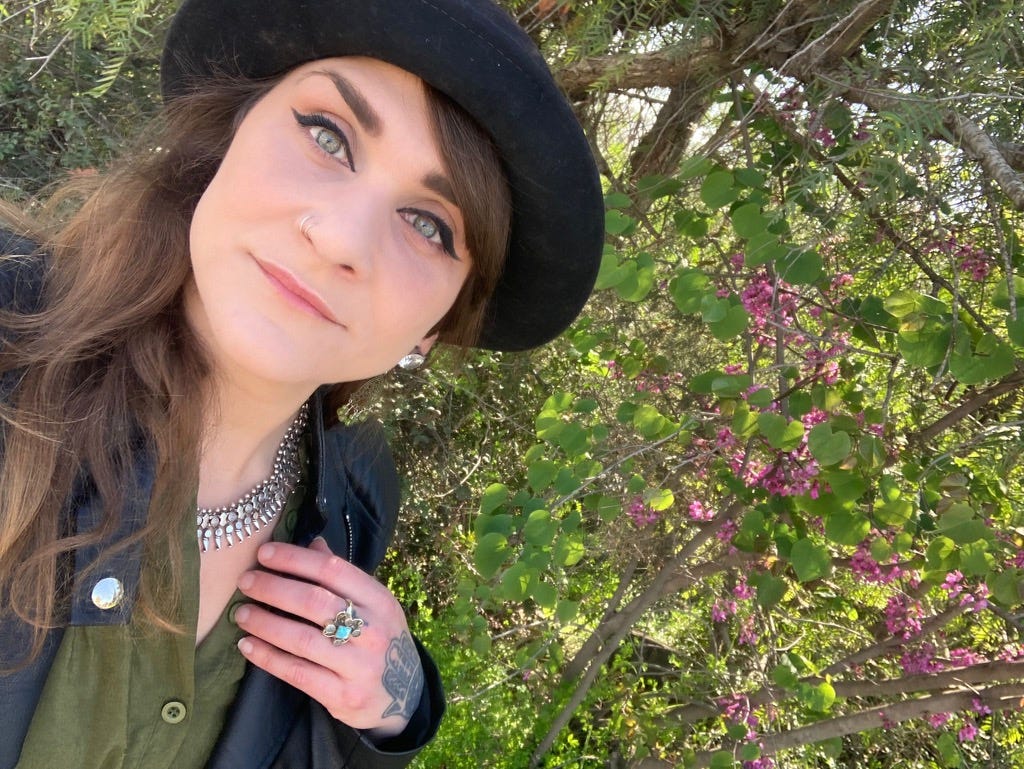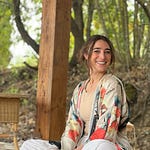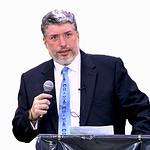Yesterday I had the great honour to interview Ateret Shmuel, who does amazing work with Indigenous people all over the world. Below is an abridged and edited transcript from parts of our conversation.
In the audio, I made mention of the Yevsektsiya of the Soviet Union.
Happy first day of Chanukah! May we see miracles every day, and a restoration of Indigenous sovereignty for us and other Indigenous peoples!
Transcript Excerpts (edited for clarity)
Laurentina: I'm very excited to be sitting here with Ateret Shmuel, Director of Indigenous Bridges. She does great things connecting our tribe with other indigenous tribes all over the world.
Now that we get to hear from you, tell us what Indigenous Bridges is, and your background.
Ateret: … I saw that it was super important to create an organization that benefited indigenous people mutually, that brought indigenous communities from around the world together to work for mutual goals and against the issues that are plaguing all of us, like genocidal settler colonialism, forced assimilation, forced conversions, erasure, historical traumas, things like that.
…by massive global superpowers like the Arab Empire which was painting, it was pushing this narrative that Jews are white European colonialist settlers who are illegally stealing poor brown indigenous Palestinian land and are committing genocide and apartheid and human rights atrocities and are responsible for white supremacy and basically just like pinning all things that are now seen as vile on the Jews.
Laurentina: What does the word “Indigenous” mean?
Ateret: We at Indigenous Bridges and also myself in my own personal work, we use a modified definition of the José Martínez Cobo definition for the UN. We define an indigenous nation as a nation who has an ethnogenesis within a specific land space. So they came into existence as a people within a specific land who have historical ties to that land that predate colonial contact.
Laurentina: Where I grew up, Anishinaabe is one of the tribes of that region and they have traditional wisdom tied to that place. [For example, each full moon is named for a change in local climate, flaura and fauna, and the energy of that space and time of year. Find a simple explanation here, a more in-depth teaching here, and a mural of this in Toronto here.]
So when people say something like, let's say, people go to a region and they live there for hundreds of years or even thousands of years, do they become indigenous? Because eventually you'll be able to say that white people are indigenous to North America because they've just been there so long.
Ateret: People are saying Arabs are indigenous to Palestine. White people have been in America longer.
Lauren: So one of my... Really?
Ateret: 50% of people who now identify as Palestinians came about 100 years ago, during the Balfour Declaration, when Jews were finally allowed to return en masse to our indigenous land, and there was such a large influx, and we didn’t have the manpower to build our infrastructure, so Arab workers from Egypt, Syria, Iraq, and Jordan came to work here. And that's where about 50% of the people who are now considered Palestinian came from. A lot of them still retain their last names that say what city in Egypt or Jordan or wherever it is they came from.
But, like, the other 50% of people who are considered Palestinian, some of them were actually indigenous Jews who were forcibly converted or had to take on Muslim identity or Christian identity over the years. Some were from various waves of settler-colonialism, whether it be the Ottomans or the British or… Romans even.
Whereas white people in America, have been in the United States for much longer.
Laurentina: Some of them have been there for 500 years.
[My family has been in Toronto for around 100 years. So that makes me as indigenous to Canada as 50% of Palestinians are to Israel.]
Ateret: …Judaism is land-based, it's a land-based indigenous religion.
…
Laurentina: Tell me more about who are you working with and in what ways and what's the relationship like between those tribes and our tribes?
Ateret: So specifically my role has been, my area of familiarity and maybe expertise is between indigenous tribal nations of the Middle East and North Africa and indigenous tribal nations of North America. … I work with several Bedouin communities, although it's a little bit different, in a different capacity.
There's also the major traditional indigenous nations out here, Kurds, Assyrians, Arameans, Copts, Amazigh [also called Berbers], Persians even would fall under that category. I also work with the Yazidis.
We all have experienced a horrific, heinous, genocidal oppression and colonialism at the hands of the Arab Empire. And the Arabization and Muslimization or Islamification of the Middle East and North Africa has been a very, very, very painful experience for almost all of the indigenous tribal nations out here.
The Zoroastrians, for example, were basically banished. The Yazidis were enslaved. There was a massive genocide only a few years ago against the Yazidis where many of their women were carted off by ISIS into sexual slavery and it was heinous, heinous, heinous. I still have nightmares about the work that I did with them at that point. And it's a very similar experience to what we just experienced on October 7th, you know, like what happened to the Yazidis and what happened to us.
The Coptic Christians in Egypt are also treated horribly by the ruling Arab colonialist empire and government that they have. So we share this experience, even the Iranians themselves, their government horribly oppresses them and it's not what they want. We all face the same heinous violent oppression and settler-colonialist occupation at the hands of the same people. And there's this growing desire to collaborate and to form alliances and really work together for our common interests and support each other in sovereignty and autonomy.
And freedom — there's a growing desire to create a new middle east that's based on this mutual respect model, this anti-colonialist model where we don't all have to be one people, we don't have to be one empire, we just need to be able to recognize one another and be like, “Hey, I see you. You're different than me, you're a different tribe than I am, you're a different nation than I am, you believe different things than I do, you have different priorities than I do, but I see you and I recognize you. And I appreciate and respect you and I will work with you for your safety, for your freedom, for your autonomy and your sovereignty and I will support you in that.” And having that be a collaborative effort that's happening now and is growing in strength and power and that has the potential to completely change the geopolitical reality here in the Middle East.
And also, really, if we're to be honest, the entire world. Because so much of what happens here affects everywhere else. I don't think people understand the power that nations like Iran or Qatar or Turkey have on the public sphere: the financing of radical terrorism and extreme acts of violence and the influence on foreign governments with oil, the human slave trade, terrorism, the weapons trade. These are major global influences.
And so if we are able to shake free from the yoke of the oppression of colonialism and put these really abusive people out of power and retake the reins ourselves, it will change literally everything.
Laurentina: A lot of them don't have governments. A lot of them are like the Copts in Egypt or the Kurds in Iran. They're minority groups within nation-states. So what I'm hearing is it's not just about us as Israel dealing with other countries at the UN level.
It's about going beyond nation-states, and tribe-to-tribe connecting with all these minority groups or all these disenfranchised, colonialized peoples that don't necessarily have government representation because their governments are not representing them at all.
So a lot of us think about the Middle East as, Israel is surrounded by
Ateret: …hostile Arab governments.
Laurentina: Yeah, like all these Muslim countries as if everyone around us is Muslim and we're the only Jews. We're less than 1% of the Middle East.
Ateret: When we look at the smaller religious groups, like Zoroastrians, or Jews, or Yazidis, or Samaritans, or whatever it is, we're very tiny in comparison, but we exist.
And the sort of Christianized indigenous communities also, like the Arameans, and the Assyrians, and the Copts, and the Maronites… Islamic law is very oppressive towards minority communities. So, you know, that is a big piece of reality here. But when we're talking about the tribal communities here, we need to remember that these are huge groups of people.
It's just that there's this apartheid-esque thing, which is that Arab colonialism, like European colonialism, has a system and a hierarchy of Ethnic Supremacy.
Laurentina: …All kinds of indigenous tribes that wish they could have their land and their sovereignty and regain their culture are looking to us on how to do that, how to find their identities again and speak their language and be their own people.
And it just occurred to me that the phrase, “A light unto the nations,” could mean not just a light unto the nation-states, but a light unto tribal indigenous peoplehood, a light unto tribal nations.
Ateret: I mean, the modern colonialist states that we have now are not necessarily the reality of existence, right?
Like, they were carved up by people that didn't have any understanding of the tribal dynamics here in the region, you know, like France and Britain and whatever. Coming in like a child with a crayon, being like, no, this was mine, and this is yours, and, like, whatever. And ran them out.
So a lot of areas were split up in ways that don't make any sense in terms of the actual populations here.
…after the Romans came and renamed this region Syria-Palaestina and what a lot of people don't even understand is that Palestine itself, it’s one of the things that really makes me question my faith in humanity, is how the “Free Palestine” movement has colonized all of the indigenous rights movements because it literally is a movement for genocidal colonialism. The Palestinians are part of the Arab Empire, and they're not just part of the Arab Empire, they're a very extremist branch of the Arab Empire.
The Palestinian people do not have, you know, the only thing that separates their national identity from the rest of pan-Arab colonialist identity is that their national identity is entirely rooted in hatred, rejection, and appropriation of Jewish history, identity, and culture.
And so, it preys on Westerners' ignorance.
But I think part of it, though, is that Westerners are so incredibly racist, excuse me for being so blunt, but they can't fathom that a non-white community could do the things that they do.
And they also believe that only white people can be an empire. And because of that, they've rebranded Jews who are not white as white people.
Laurentina: Only because it's a bad thing. When white is a bad thing, they call us white. But when white is a good thing, like with white supremacists, they say the Jews are not white.
Ateret: Right. But Jews don't fit into either of those categories because the system of white supremacy is traditionally an Americentric or Eurocentric tradition based on white Europeans, and their relationship to Black Africans that they enslaved and Native Americans who they genocided. And so it's like this white-black racial dichotomy that Jews do not fit into.
Not only Jews, but the overwhelming majority of the world who's neither European nor African, do not fit into this dichotomy. So with us as a Middle Eastern people with a very wide variety of skin tones.
…
Einstein had to be given his own department at Princeton because he wasn't allowed to teach, because he was a Jew, at almost all of the other universities.
This is not new.
That whole... Did you see the congressional hearing with the presidents of Harvard, MIT, and UPenn the other day?
It was heinous. I mean, it was really painful to watch. Because again, we've come to this.
…Harvard and MIT and UPenn, the Ivy Leagues and MIT are now these hotbeds of virulent, violent anti-Semitism where Jewish students are literally terrified for their lives.
And it's all under this really sneaky, backwards, inverted narrative of settler colonialism and indigeneity and also like Jews being white …
They're so committed to this narrative of Jews always being evil and Jews always being the oppressor that when something bad happens, it's like believe women except not the Jewish women.
…Palestinians are super-proud Arab colonialists. There’s a real oppennes about their desire, especially within terrorist organizations like Hamas and Hezbollah and the Islamic Jihad, the people and the Ayatollah also, the people who participated in these massacres, to create a global caliphate.
They want to take over the world. That's their entire mission statement. And global pan-Arabism does not equal indigenous. And they're open about it. This is a massive colonialist empire.
But the brainwashing and the indoctrination and the propaganda has been so successful. And part of it has been from Qatar.
Are you familiar with Al Jazeera?
Laurentina: Yeah, that's the main, biggest news media outlet of the Arabic-speaking world, right?
Ateret: So Al Jazeera is Qatar's state-funded propaganda mill. It's funded and managed by the Qatari government. [Listen to the audio, starting at 48 minutes, to learn about their 3 very different divisions: Al Jazeera Arabic, Al Jazeera English, and AJ Plus. You can find examples at MEMRITV.org.]
…
Indigenous communities around the world face a lot of the same issues. Forced assimilation, cultural genocide, physical occupation…
These are legitimate issues that need legitimate focus. And if we work together, those of us who actually understand the experience of that, if we work together and are able to support one another and help one another through these things, we really can change everything.
The problem is, is that so many of our youth have been really indoctrinated.
And especially, one of the things that's been so hard for me since October 7th, is seeing how many of the young activists and content creators and social media influencers within the Native world have really taken on pan-Arab colonialism as a piece of their activism without understanding it at all.
But I want to say something that I think is really important for people to know, which is that that's not across the board.
So many people reach out to me all the time, all the time, especially people in positions of leadership in Native American and First Nations communities. I get at least weekly phone calls and text messages from many different Chiefs and council members and Elders and tribal chairs and people like that, being like, “Listen, I see what's happening. This is crazy. I'm so sorry. I stand with you. You have my love, solidarity and support. Know that our people stand with your people.”
And there seems to be this disconnect between, there's a generational divide. So the people over 50, especially in positions of indigenous governmental leadership, tend to view Israel as a precedent for what they want for their own nation. The return of dignity and sovereignty to their own people. And are old enough or remember the stories of how Jews regained sovereignty in our own land, and so they see us much more favourably.
And then there are people who are under 40 who have just been educated on TikTok by antisemites. And so their whole view of the Middle East and North Africa is just completely bonkers. And yet they’re very loud, and they’re very present, and it’s become this cult-think.
It’s really scary. You cannot question the ideology. It’s too threatening.
On a positive note… There’s a groundswell, and I have hope that it’s going to change the entire nature of not just the geopolitical reality here, but also all over the world.
And my hope is that we will live to see an era where Indigenous communities are able to regain sovereignty, are able to live lives of dignity and opportunity and safety and autonomy outside of the grip of colonial occupation and genocide, and that we can do that together. And we have to do that together. We have to collaborate in order to lift up each other.
Our community is made up of indigenous tribal nations all over the world, from Australia, New Zealand, South America, Asia, parts of the Middle East. Not just Native American, but also Maori and Aboriginal and Pacific Islanders.
And it's growing.
Our community is growing and growing and growing all the time. And there is real beauty and real hope in that. Because together we really are capable of making the world a much better place.
Laurentina: It's amazing. I love what you do. And how can somebody get more involved?
Ateret: We're available online. Our website at IndigenousBridges.com. Donations can be made through indigenousbridges.com.
We're also available on Instagram, Indigenous Bridges. You can follow me, I post a lot of what we do. I'm on Instagram, Ateret Shmuel.
We have an Indigenous Bridges Facebook community. We have Indigenous Bridges Conversation, which is so people from different tribal nations can talk to one another. And we also have a Facebook page.










